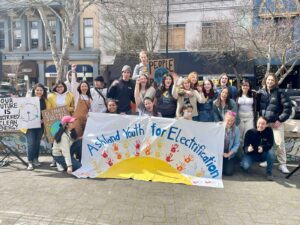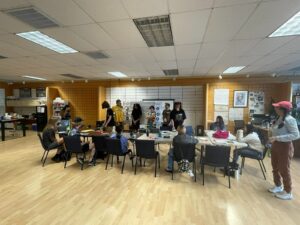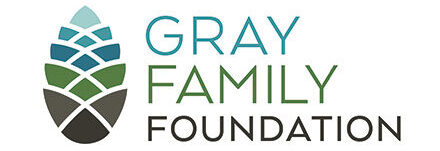A Partnership Built on Youth Community Organizing: Rogue Climate and Rogue Action Center

For young people living in Southern Oregon, the impacts of climate change – wildfires, smoke, flooding, drought, and heat – have been front and center for most of their lives, impacting everything from the local economy to their own mental health and well-being.
In 2017, two Rogue Valley-based organizations united to form a Youth Leadership Initiative internship, which provides Southern Oregon youth with the opportunity to do something about climate change. Together, Rogue Climate and Rogue Action Center (RAC) share the similar and critical goal to empower those most impacted by climate change in Southern Oregon to become leaders in social justice and climate justice movements through the power of community organizing.
 The 8-week internship teaches interns the basic skills of campaigning, planning, and participating in lobbying sessions. They do hands-on grassroots community organizing work, including canvassing, petitioning, phone banks, and attending council meetings. It’s an opportunity to not only have discussions about what climate justice is and how it can be achieved, but it’s an opportunity for young people to join ongoing climate and social justice campaigns and to do the work.
The 8-week internship teaches interns the basic skills of campaigning, planning, and participating in lobbying sessions. They do hands-on grassroots community organizing work, including canvassing, petitioning, phone banks, and attending council meetings. It’s an opportunity to not only have discussions about what climate justice is and how it can be achieved, but it’s an opportunity for young people to join ongoing climate and social justice campaigns and to do the work.
“Youth are encouraged to share about how they’ve been impacted, the anxieties, the frustrations, and to create creative and collaborative solutions to those things,” says Jordan Bruyn, Co-Executive Director of RAC. “We see ourselves in the work, and youth have every right to be at those decision-making spaces.”
Bruyn co-leads the internship with Blanca Gutierrez, Leadership Development and Culture Director at Rogue Climate. As a group, interns examine how climate justice and social justice intersect, especially as youth in Southern Oregon see the impacts of climate change compounded by housing insecurity, white supremacy movements, and a lack of public transit, mental health support, and language access.
In a Climate Justice 101 offered in the internship, interns talk about their vision and definitions of a healthy environment.
“Their ideas span beyond the typical eco-friendly market-based solutions that are popular, and what you are taught as a kid…efficient light bulbs and recycling plastic bottles,” says Gutierrez. “When we start talking about climate justice, and defining that as a group, we start talking about a human system. Youth talk about affordable housing that is sustainable, and how that is part of a vision for climate justice and thriving transport systems versus everyone having a car, medical care for whole communities, and people living full lives.”
The Rogue Valley is a biodiverse region in Southwestern Oregon along the middle Rogue River. The land was historically stewarded and still inhabited by several Indigenous Tribes including Shasta, the Dakubetede, Takelma, and Latgawa. It’s largely rural with Ashland, Medford, and Grants Pass counting as the three largest communities.
Across the board, the impacts of climate change in Southern Oregon have impacted everyone, but Bruyn notes that BIPOC communities have been impacted particularly hard. “They are living in neighborhoods that are uniquely vulnerable to heat, pollution, and wildfires; we saw that specifically when the majority of the homes lost by the Almeda fire were mobile homes,” says Bruyn. “Those were homes of many Latinx farmworker families, low and fixed income households, and it’s been often framed that BIPOC communities are hit first and worst.”
The Almeda fire swept through the valley in September 2020. It destroyed over 2,600 homes, and was especially devastating to the small cities of Talent and Phoenix in Jackson County. Part of the work for climate justice includes making sure that emergency alerts for these events are delivered in a variety of languages, and that people impacted have access to the recovery resources.
A critical goal of the internship is to equip the people most impacted by climate change with the tools and opportunities to take part in solutions. People of Color, trans and gender nonconforming people, people from poor and working-class backgrounds, disabled people, and women are highly encouraged to apply to a specific BIPOC cohort. Additionally, all interns regardless of background in each cohort participate in a workshop titled Power, Privilege and Oppression, which Bruyn says demonstrates “the link between systematic racism and oppression to those institutionalized structures and policies that have contributed to climate injustice.”
The wisdom of Indigenous tribes is incorporated into the curriculum. During the winter of 2024, interns participate in a Vesper Meadows Fire Ecology workshop, which examines the role of traditional ecological knowledge and Indigenous culture in fire ecology and management.
“For time immemorial, Indigenous folks in communities have key pieces to share on [climate change] and we need to give space to talk about that,” says Gutierrez. “Everything doesn’t have to be new.”
Interns also participate in Event Preparation, Campaign Planning, and Community Organizing 101 workshops. A Lobbying 101 training shows interns what the lobbying process looks like. Interns are anywhere from 14 to 30 years old, a range which promotes multigenerational conversations between high school, college, and post-college perspectives.
In 2022, the internship was supported in part due to a joint grant awarded to both Rogue Climate and RAC from the Gray Family Foundation. The funds helped support program expansion, and provided materials for 15 interns per cohort, and a $415 stipend each throughout 2023.
From 2017 through 2022, 170 youth leaders completed the program. During their time in the program and after, interns and graduates have participated in ongoing campaigns, including Ashland Youth for Electrification. The current campaign advocates for a Climate and Clean Air ordinance that would limit new gas hookups in new residential areas to improve air quality, limit pollution, and support energy efficiency. Interns gather petition signatures, attend public meetings, and help to spread the word and build interest in support of passing the ordinance.
Opportunities abound for program graduates, including taking part in the Rogue Climate Action Team (RCAT), which participates in environmental policy-making and implementation and represents the priorities of Rogue Valley communities. Employment within the organizations is possible, as Bruyn herself is a former intern.
Ongoing efforts and campaigns include, but are not limited to, taking action to shut down area pipeline expansion proposals, building resilience hubs for people impacted by fire and climate events, and understanding offshore wind project development.
“Throughout the history of our organizations, we’ve worked on so many things, there’s always opportunities,” says Gutierrez.
